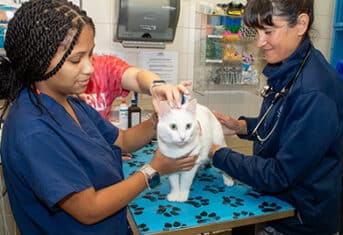Immune Mediated Neutropenia: What You Need to Know

Immune Mediated Neutropenia: What You Need to Know
I recently wrote about the concept of immune disease; those disorders where the immune system goes haywire and attacks normal cells in the body. In more recent blog posts, I wrote about two important immune diseases: immune mediated hemolytic anemia (IMHA) and immune mediated thrombocytopenia (ITP or IMTP). Today’s blog post focuses on a third immune disorder of blood cells: immune mediated neutropenia.
Neutrophils Fight Infection
Neutrophils are the first responders of the immune system. When you get a splinter in your finger, neutrophils rush to the site to start cleaning up bacteria and other nasties. The accumulation of neutrophils in a focal site is known as an abscess. Without neutrophils, the immune system cannot inactivate infectious agents, and patients run the risk of developing a life-threatening systemic infection.
Immune Mediated Neutropenia
Neutropenia is just a fancy way to say a low neutrophil count. Similar to dogs and cats with IMHA and IMT, the immune system of pets with immune mediated neutropenia destroys blood cells, specifically, neutrophils.
Recognizing Immune Mediated Neutropenia
Immune mediated neutropenia is much less common than either IMHA or IMT and is less common in cats than in dogs. A recent study found dogs with immune mediated neutropenia saw their veterinarian because of poor appetite, lethargy or fever, which are all very non-specific clinical findings. A complete blood count is required to identify a low neutrophil count, but if neutropenia is identified, your veterinarian will recommend a battery of tests to evaluate your dog or cat’s low neutrophil count. In addition to immune mediated destruction, low neutrophil counts can result from an infectious disease like ehrlichiosis, a fungal disease such as histoplasmosis or a bone marrow disorder.
Treatment of Immune Mediated Neutropenia
Like the other immune blood cell disorders, initial treatment of dogs and cats with immune mediated neutropenia involves suppressing the immune system with steroids. According to recent research, most dogs with immune mediated neutropenia responded quickly to steroid administration, while a few required additional immunosuppressive agents to correct the neutropenia. While I hope your dog or cat never gets immune mediated neutropenia, the majority of pets diagnosed with this disorder survive for an extended period of time.































